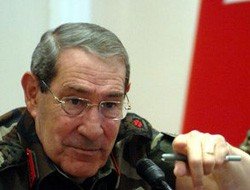Rights Activists Decry Army Chiefs Remarks
"Buyukanıt's remarks about an attempt to divide the country using concepts like human rights or democracy is a clear threat to those who urge for peace", said Turkey's Human Rights Association (İHD) chair Yusuf Alataş to bianet.
"This approach doesn't comply with a state of law" added Association for Human Rights and Solidarity with the Oppressed (MAZLUMDER) chair Ayhan Bilgen.
Both men were among the initiators of the conference, "Turkey Looking for Peace", which was held in the beginning of January in Ankara aiming at sparking a debate on the century old Kurdish conflict in southeastern Turkey.
Buyukanıt pointed the finger to the conference while talking about threats towards the country's unity.
"Various groups gathered together around a prospect for peace in that conference. But it's very hard to back the militarist discourse, who defines the conflict solely as a problem of terror" said Asst. Prof. Nazan Ustundag.
Buyukanıt: "Terrorism disguised as human rights"
During a closed conference at the Washington Institute, Gen. Buyukanıt made the following remarks with reference to the conference:
"If you closely look at the final declaration of the conference, you can clearly identify the actors who will lift the curtains. The plan is this: Is it possible to turn the PKK (pro-Kurdish guerilla group), which is recognized as a terrorist organization by numerous states, into an identity? This is the question.
Some circles respond positively to this question. Into which identity will we transform the organization? We'll demote it to human rights and minorities. Let's talk about a pluralist state and move the issue to the political platform". Buyukanıt also implied international forces' involvement in that matter.
Furthermore, army chief Buyukanıt has accused the two main Kurdish factions in neighboring northern Iraq of supporting Turkish Kurd rebels and he has raised objections to any moves by the government to seek dialogue with them.
Militarism as usual
Alataş points to the potential influence of Buyukanıt's words on the public, creating more hostile connotations on demands for human rights and democracy.
Army's existence and current level of influence rests on the continuance of the conflict, he said.
"That's why they constantly employ a discourse of 'internal and external threats'"(TK/EÜ)
KURDISH QUESTION
PKK Ceasefire to be Terminated on 31 October?

KCK CASE
Court Dismissed Request for Defence in Kurdish

7th Istanbul Gathering for Freedom of Thought

CONSTITUTIONAL AMENDMENTS
58 Percent Said "Yes" to Constitutional Reform Package

Rights Organizations 3 Years ahead of Foreign Minister






